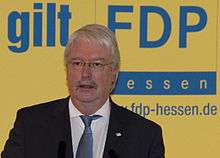Hessian state election, 2008
| | |||||||||||||||||||||||||||||||||||||||||||||||||||||||||||||||||||||||
| |||||||||||||||||||||||||||||||||||||||||||||||||||||||||||||||||||||||
| |||||||||||||||||||||||||||||||||||||||||||||||||||||||||||||||||||||||
| |||||||||||||||||||||||||||||||||||||||||||||||||||||||||||||||||||||||
 |
| This article is part of a series on the politics and government of Germany |
|
Constitution ("Fundamental Law Code") |
|
| Foreign relations |
The state election to elect members of the Landtag of Hesse was held in the German state of Hesse on 27 January 2008.
Background and issues
For the previous 5 years, Hesse's state government (Landtag) had been ruled by the CDU, which had taken a majority of seats in the 2003 elections.
In the run-up to the election, opinion polls were showing that the CDU had lost popularity. The incumbent CDU minister-president Roland Koch initiated a tough-approach campaign against immigrant youth violence as an electoral tactic.[1] The German political left attacked it as xenophobic at the time. Other issues were various economic issues including minimum wage concerns, education, and controversy over the planned major expansion of the Rhine-Main airport.
The far-left Linke party stood for elections in Hesse for the first time in 2008, as did the far-right NPD. The generally sour political mood was as "a rising tide lifting the boats" of all non-centrist parties.
Inconclusive outcome
The 2008 election saw the CDU's share of the vote plummet to its lowest level since the 1966 Landtag election. (This abysmal performance by the CDU was also mirrored in the Bavaria state election later that year, which saw CDU/CSU support decline to its lowest level ever.)
The SPD, under its leader Andrea Ypsilanti, increased its share of the vote substantially, from 29% to 37%, and it claimed victory as a result. The other winner—and perhaps the bigger winner overall considering their relative starting positions and the subsequent events in Hesse politics—was the far-left Linke party. They entered the Hesse Landtag with 5.1% of the vote, clearing the five-percent hurdle. This was the second western Landtag in which the Linke party had won seats (the first having been earlier in 2008 in Lower Saxony).
The SPD and the CDU both wound up with 42 seats (of 110). Being that neither was able to form a majority, there was a several-month-long lull, during which no one knew what would happen. The center-right CDU could not form a government with its most natural ally the free-marketist FDP, nor could the center-left SPD with its most natural ally the Greens. And no one wanted a grand coalition of the two centrist parties (SPD and CDU). The far-left Linke party and its 6 seats was thus the kingmaker, exactly the result it had hoped for.[2]
Ypsilanti had long refused to negotiate with the far-left, but finally caved in and began talks to include them in a red-green-red coalition (SPD-Greens-Linke), with herself as Minister-President. This was a very controversial move, which sparked an internal revolt within the SPD as many members bitterly refused to participate in power-sharing with "neo-Communists"[3] (the Linke is the successor party to the East German ruling party 1949-1989). In November 2008, one day before Ypsilanti should have been elected Minister-President in the Landtag, four MPs of the Hesse SPD made a vote of no-confidence on her leadership, after which it was clear that no government was able to be formed.[4] This inconclusive result forced new elections, which were held in January 2009.
Results
| Party | Ideology | Vote % (change) | Seats (change) | Seat % | |||
|---|---|---|---|---|---|---|---|
| Christian Democratic Union (CDU) | Center-right | 36.8% | −12.0% | 42 | −14 | 38.2% | |
| Social Democratic Party (SPD) | Center-left | 36.7% | +7.6% | 42 | +9 | 38.2% | |
| Free Democratic Party (FDP) | Free market | 9.4% | +1.5% | 11 | +2 | 10.0% | |
| Alliance '90/The Greens (Die Grünen) | Environmental, left-wing | 7.5% | −2.6% | 9 | −3 | 8.2% | |
| The Left party (Linke) | Left-Wing, Far-left | 5.1% | +5.1% | 6 | +6 | 5.5% | |
| The Republicans (Republikaner) | Far-right | 1.0% | −0.3% | ||||
| Free Voters (Freie Wähler) | Various, lean right | 0.9% | +0.9% | ||||
| National Democratic Party (NPD) | Far-right, nationalist | 0.9% | +0.9% | ||||
| Animal Welfare Party (Tierschutzpartei) | Animal rights | 0.6% | -0.2% | ||||
| Family Party (FAMILIEN) | Family advocacy | 0.3% | +0.3% | ||||
| Pirate Party (PIRATEN) | Single-Issue | 0.3% | +0.3% | ||||
| Gray Panthers (Graue) | Pensioner's Advocacy | 0.2% | +0.2% | ||||
| Starting Now (Volksabstimmung) | Far-right | 0.1% | +0.1% | ||||
| The Violets (Violetten) | Spiritualist | 0.1% | +0.1% | ||||
| Independent Citizens' Party (UB) | 0.1% | +0.1% | |||||
| All Others | 0.1% | −1.9% | |||||
| Total | 100.0% | 110 | 0 | 100.0% | |||
Turnout was at 64.3%, slightly down from 64.6% in the 2003 elections.
Pre-election polls
| Party | FG | Infra | Emnid | Forsa | FG | Forsa | Infra | TNS | Forsa |
|---|---|---|---|---|---|---|---|---|---|
| Date | 11.01. | 09.01. | 05.01. | 12.12. | 7.12. | 26.09. | 06.09. | 24.07. | 28.06. |
| CDU | 40% | 40% | 42% | 41% | 40% | 43% | 42% | 40% | 41% |
| SPD | 36% | 35% | 32% | 30% | 34% | 30 % | 32% | 33% | 27% |
| Greens | 7% | 9% | 10% | 11% | 9% | 9 % | 10% | 11% | 11% |
| FDP | 8% | 9% | 8% | 9% | 7% | 8% | 8% | 7% | 9% |
| The Left | 5% | 4% | 5% | 5% | 6% | 5 % | 4% | 5% | 6% |
| Other Parties | ? % | 3% | 3% | 4% | 4% | 5 % | 4% | 4% | 6% |
FG=Forschungsgruppe Wahlen; Infra=Infratest dimap; TNS=TNS Infratest



